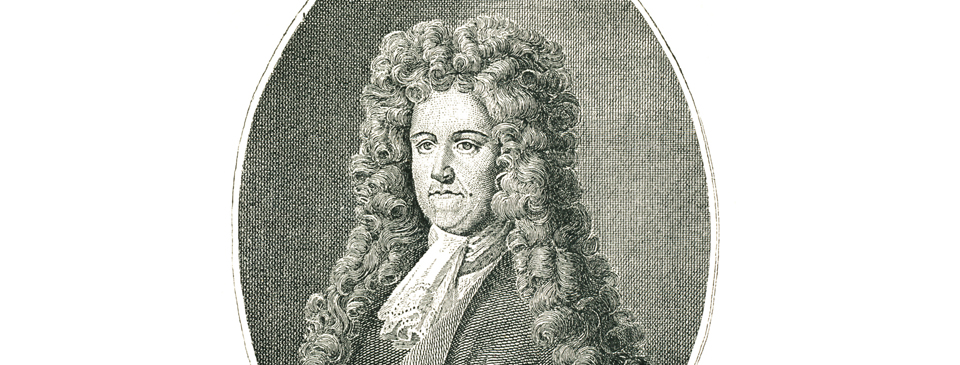Daniel Defoe

An engraving of Daniel Defoe when he was about 43 years old. It was produced by the Flemish engraver Michael Vandergucht, after a painting by Jeremiah Taverner, and used as the frontispiece of Defoe’s 1703 book ‘A True Collection of the Writings of the Author of the True Born English-man’.
At the time of the Glorious Revolution Foe was starting to make investments in overseas trading and in farmland at Tilbury in Essex. He was by then regularly writing pamphlets and began to sign himself as ‘Defoe’. The trading investments were a disaster, however, and he was declared bankrupt by creditors, owing £17,000. In October 1692 he was committed to Fleet Prison and then the King’s Bench Prison. He lost the family house, warehouse and the hosiery business and continued to owe money for the rest of his life.
A more successful venture for a period of time was the land at Tilbury where he went into partnership producing bricks. For many years after the Great Fire there was a large demand for rebuilding in London and Defoe was able to supply Sir Christopher Wren for the new St. Paul’s Cathedral and Royal Naval Hospital at Greenwich.
Defoe had an active mind and a way with words and continued to compose pamphlets for various clients for a fee. In the late 1690s he produced a number of highly controversial pamphlets that not only made him famous but also gained him influential enemies on both sides of the political divide. When a verse was written against King William, Defoe responded with what became his most famous diatribe, the verse satire The True-Born Englishman, published in 1700. It was aimed at those who saw the King as a foreigner surrounding himself with Dutch advisors, reminding his xenophobic readers they were all descended from immigrants. It was an instant hit, went on to be reprinted 40 times over many years and remained his most famous work during his lifetime.
It was Defoe’s writing during the time of the hysteria surrounding the preaching of the extreme Tory Dr. Henry Sacheverell that landed him in the greatest trouble. He anonymously wrote a satirical pamphlet in 1702 entitled The Shortest Way with Dissenters, apparently written by a bigoted and racist Tory with similar views to Sacheverell, wishing death on Dissenters. Many Tories took the work literally and praised its ideas, not realising it to be a satire and a hoax. Realising they had been deceived Tories sought the author in order to punish him. No less a person than the Earl of Nottingham was appointed to investigate. Defoe was forced into hiding, advertisements appearing in the London Gazette offering a reward for his capture. He was indicted in his absence at the Old Bailey on a charge of inciting hatred of Dissenters, ironically the very opposite of his intention, and members of the House of Commons ordered copies of The Shortest Way… to be burnt. After spending months in hiding he was apprehended at Spitalfields in July 1703 and interrogated for two days by Nottingham, who believed him to be in league with opposing politicians, and then sent to the notorious Newgate prison.
Defoe’s trial at the Old Bailey attracted a large crowd. Unfortunately for him the judges and jury were all men whom he had previously criticised or mocked in pamphlets so the verdict was a foregone conclusion. He received a heavy sentence of prison, a large fine and three days in the pillory. He was also bound to be well-behaved for a further seven years, which would put him in constant danger of arrest while he continued writing critical literature. The Quaker William Penn intervened on his behalf but by then Penn’s influence with the monarch had waned. Queen Anne, believing Defoe was in league with others in a subversive political plot, ordered he appear before her and he was transported from Newgate to Windsor Castle in order to make a confession, which was not forthcoming. He stood in the pillory for three days, while copies of Hymn to the Pillory, that he had composed and printed, were distributed to cheering supporters.
Defoe was then taken back to Newgate to languish for an indefinite period and during that time the previously flourishing brick and tile business, which had kept him and his growing family in comfort for some years, closed, leaving him with no reliable income. However, the leading politician of the time, Robert Harley, was hatching a plot to employ him as a spy and psephologist and after three months used his influence to have him released.


